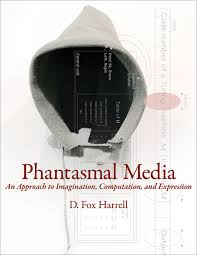As the semesters wrap up and the summer months begin in the Northern Hemisphere, you might find yourself with a little more time to catch up on your digital lit reading. Today we begin a weekly reading series featuring recent critical and creative works in electronic literature by ELO members.

The first scholarly book is Phantasmal Media: An Approach to Imagination, Computation, and Expression by D. Fox Harrell. Published in 2013, Harrell’s conceit of the phantasm offers him a framework for exploring the unseen figures (of speech, self, and thought) moving within within computational media. Among the many featured texts in the book, Fox presents two of his works Living Liberia Fabric and The Girl with Skin of Haints and Seraphs, as he discusses aspects of GRIOT, his narrative generation system.
In addition to serving on ELO’s Board of Directors (currently on temporary leave), Harrell is an Associate Professor of Digital Media at MIT where he directs the Imagination, Computation, and Expression Laboratory.
From the publisher:
In Phantasmal Media, D. Fox Harrell considers the expressive power of computational media. He argues, forcefully and persuasively, that the great expressive potential of computational media comes from the ability to construct and reveal phantasms — blends of cultural ideas and sensory imagination. These ubiquitous and often-unseen phantasms — cognitive phenomena that include sense of self, metaphors, social categories, narrative, and poetic thinking — influence almost all our everyday experiences. Harrell offers an approach for understanding and designing computational systems that have the power to evoke these phantasms, paying special attention to the exposure of oppressive phantasms and the creation of empowering ones. He argues for the importance of cultural content, diverse worldviews, and social values in computing. The expressive power of phantasms is not purely aesthetic, he contends; phantasmal media can express and construct the types of meaning central to the human condition.
Harrell discusses, among other topics, the phantasm as an orienting perspective for developers; expressive epistemologies, or data structures based on subjective human worldviews; morphic semiotics (building on the computer scientist Joseph Goguen’s theory of algebraic semiotics); cultural phantasms that influence consensus and reveal other perspectives; computing systems based on cultural models; interaction and expression; and the ways that real-world information is mapped onto, and instantiated by, computational data structures.
The concept of phantasmal media, Harrell argues, offers new possibilities for using the computer to understand and improve the human condition through the human capacity to imagine.
[If you are a current ELO member and would like to have your work featured in our Summer eReading series, please contact Director of Communication, Mark Marino: mark c marino at g mail.]
